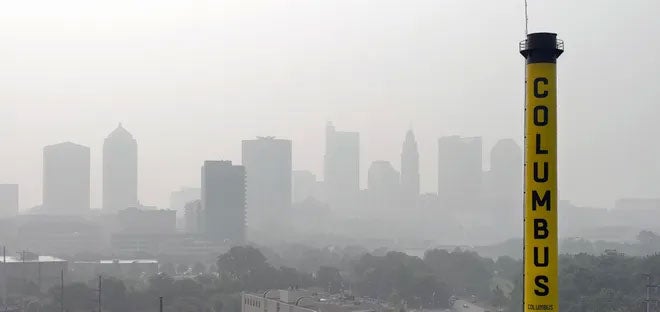Your Air Quality Safety Guide:
The recent increase in air pollution has led to widespread low air quality warnings and advisories in many regions. Prolonged exposure to such compromised air quality can severely affect public health, ranging from respiratory and cardiovascular ailments to long-term impacts on overall well-being. Understanding the effects of this persistent haze and its potential implications is vital as communities seek ways to mitigate the health hazards caused by prolonged exposure to poor air quality.
Understanding Air Quality Index (AQI)
The AQI is a standardized index used to communicate air quality in terms of potential health impacts. It takes into account multiple pollutants and provides a numerical value along with corresponding categories ranging from "Good" to "Hazardous."
1. Good (0-50): The air quality is in a satisfactory range, with minimal or no risk from air pollution.
2. Moderate (51-100): The air quality is acceptable, though a slight health concern may exist for a small number of individuals who are especially sensitive to pollutants.
3. Unhealthy for Sensitive Groups (101-150): Air quality poses a potential risk to sensitive groups like children, the elderly, and those with respiratory or heart conditions. The general public is unlikely to be affected.
4. Unhealthy (151-200): Air quality could lead to health effects for everyone, while members of sensitive groups might experience more pronounced impacts.
5. Very Unhealthy (201-300): A health alert stage, where everyone could experience severe health effects due to the air quality.
6. Hazardous (301-500): Emergency conditions with health warnings, indicating a high likelihood of adverse health effects across the entire population.
How low air quality affects your health:
Being outside for too long during a low air quality warning can have several adverse effects on your health due to exposure to harmful pollutants and particulate matter. The impact of poor air quality can vary depending on the individual's sensitivity, the specific pollutants present, and the duration of exposure. Here are some potential effects:
1. Respiratory Irritation: Poor air quality often contains high levels of particulate matter and other pollutants that can irritate the respiratory system. Prolonged exposure may lead to throat irritation, coughing, wheezing, and shortness of breath.
2. Aggravation of Respiratory Conditions: Individuals with pre-existing respiratory conditions, such as asthma, chronic bronchitis, or emphysema, may experience worsening symptoms during low air quality episodes. It can trigger asthma attacks or exacerbate chronic respiratory problems.
3. Cardiovascular Issues: Air pollution is associated with an increased risk of cardiovascular problems. Exposure to polluted air can lead to higher blood pressure, irregular heartbeats, and even heart attacks, especially in susceptible individuals.
4. Headaches and Dizziness: Poor air quality can cause headaches and dizziness, primarily due to pollutants that affect the central nervous system.
5. Fatigue and Reduced Energy Levels: Breathing in polluted air requires more effort from your body, leading to increased fatigue and reduced energy levels. This can make outdoor activities less enjoyable and negatively impact overall productivity.
6. Allergic Reactions: Low air quality often includes allergens like pollen, mold spores, and other particles that can trigger allergic reactions in susceptible individuals.
7. General Malaise: Prolonged exposure to poor air quality can lead to general malaise, including a lack of concentration, mood swings, and overall discomfort.
8. Long-term Health Impacts: Chronic exposure to air pollution can have serious long-term health effects, including an increased risk of developing respiratory diseases, cardiovascular problems, and other chronic illnesses.
To protect your health during low air quality warnings, it's crucial to:
1. Keep Windows and Doors Closed: Seal your home by closing windows and doors to prevent outdoor pollutants from entering. This simple step can help maintain better indoor air quality.
2. Use Air Purifiers: Consider using high-efficiency particulate air (HEPA) filters or air purifiers to improve indoor air quality. These devices can help remove harmful particles and allergens from the air.
3. Limit Outdoor Activities: Minimize outdoor activities, especially strenuous exercise, during poor air quality. If you must go outside, try to do so during periods when air quality is better, such as early morning or late evening.
4. Use N95 Masks: If you need to go outside and the air quality is significantly compromised, consider wearing an N95 mask. These masks can help filter out fine particles and pollutants, reducing exposure to harmful substances.
Remember, prioritizing your health and safety during low air quality warnings is essential. Taking these precautions can significantly minimize the potential adverse effects on your respiratory system and overall well-being!
For more information about Mount Carmel Pulmonary services, visit here.
*Image source: Doral Chenoweth/Columbus Dispatch

